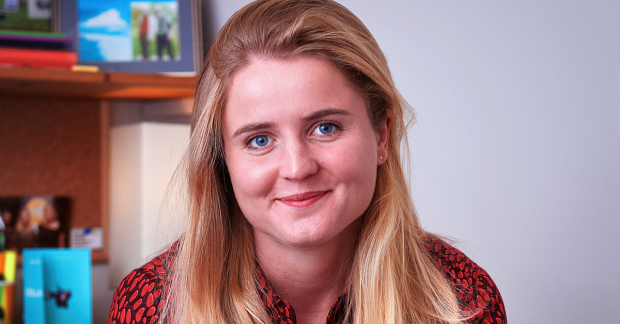Producer Ellie Keel on the Women's Prize for Playwriting: 'These are big big plays…they need a particular scale'
Keel has collaborated with Paines Plough, 45North and Sonia Friedman Productions on the new prize

© Alex Brenner
Despite the fact only a few theatres have been able to open for live performances, producer Ellie Keel has been hard at work producing, creating and shaping a variety of projects.
Keel has some sturdy hits under her belt – Mary Higgins and Ell Potter's Fitter and Hotter have enjoyed sell-out runs both at the Soho Theatre and at the Fringe, while Margaret Perry's co-produced Collapsible was widely commended last summer.
Speaking to WhatsOnStage, she admitted that the widespread cancellations has led to some serious reshuffling. "I had a five year plan for EKP (Ellie Keel Productions, her company) that I've just changed the order of. I've delayed all the productions but moved forward all the development work."
Her company was meant to have a handful of shows up at the Edinburgh Fringe (a double-bill of Fitter and Hotter as well as Rafaella Marcus' debut piece) in association with hit touring company Paines Plough, but these have been put on hold with the Festival cancelled. As Keel puts it: "I learned so much in 2019 that I was looking forward to another crowded 2020, and was excited to doing it again and doing it better."
Which means its been all systems elsewhere: "Those cancellations have enabled me to focus on other things in a productive way". One of the more recent projects, alongside theatre company 45North, has been Written on the Waves a series of new audio plays brought to life by creatives unable to appear on stage.
One other thing Keel, along with Paines Plough, 45North and Sonia Friedman Productions have had to deal with is the small matter of over 1,100 entrants in the inaugural Women's Prize for Playwriting. The scheme, running over the last 12 months, will see the winner net a £12,000 prize in respect of an exclusive option for lead producers to co-produce a staged version of their entry.
With the seven finalists now revealed and the winner being announced next month, Keel is excited by the response so far: "These are big big plays and that's what we wanted to do from the off. They're plays that come from the breadth and depth of your imagination."
In terms of the content, she "noticed lots of common features. A lot of them were written with a sense of justice at their core. A sense of trying to shine a light on something, to highlight its unfairness or its immorality…People highlighted a social or political problem and went straight for it. One of the plays on the shortlist called Contact Centre is about a group of women working in a call centre and one of the group being made redundant. It's not an "issue" play – it's still theatrically inventive. There's a giant rabbit in it, which I thought was wonderful."
As for when the winning piece will be seen on stage, that's (understandably, given a certain pandemic) a bit up in the air, though is likely towards the end of 2021: "These aren't low key plays to produce. They need a particular scale and a particular platform. The bigger the scale and the higher the platform, the longer it takes. This will set the tone for years to come – we set out to say that women's work needs to be shown on a national scale, and that means going for a certain level of venue…We want the best place for it, the best director. The right cast. That sweet melding of circumstances that determines the success of a play."
It's hard to understate how successful the prize has been for its first year, something that Keel attributes to the careful forethought put into planning the scheme. "We gave a lot of thought to how we phrased everything. Like how we approached the phrase "identity" and "identify as female". We wanted to be inclusive and use wording that was robust enough to support the change of language around these issues. Which has changed even since we set the Prize up."
A lot of this was also down to what was asked of writers: "We were very open and encouraging of work at all stages of development. Charlotte Bennett [co-artistic director of Paines Plough] had a great idea that people should submit a covering letter. People were confident to send in their work knowing they could give some context to it."
But what have Keel and her co-producers got in store for the future of the prize? "We want to make it useful as a resource. We ask ourselves – what is it doing for the industry and writers. That means also asking writers who did and didn't enter: 'what do you need?' We might do competitions for school-aged women, or screenwriters. There's a lot on the table.
"The Prize is about serving writers, rather than writers serving it."












